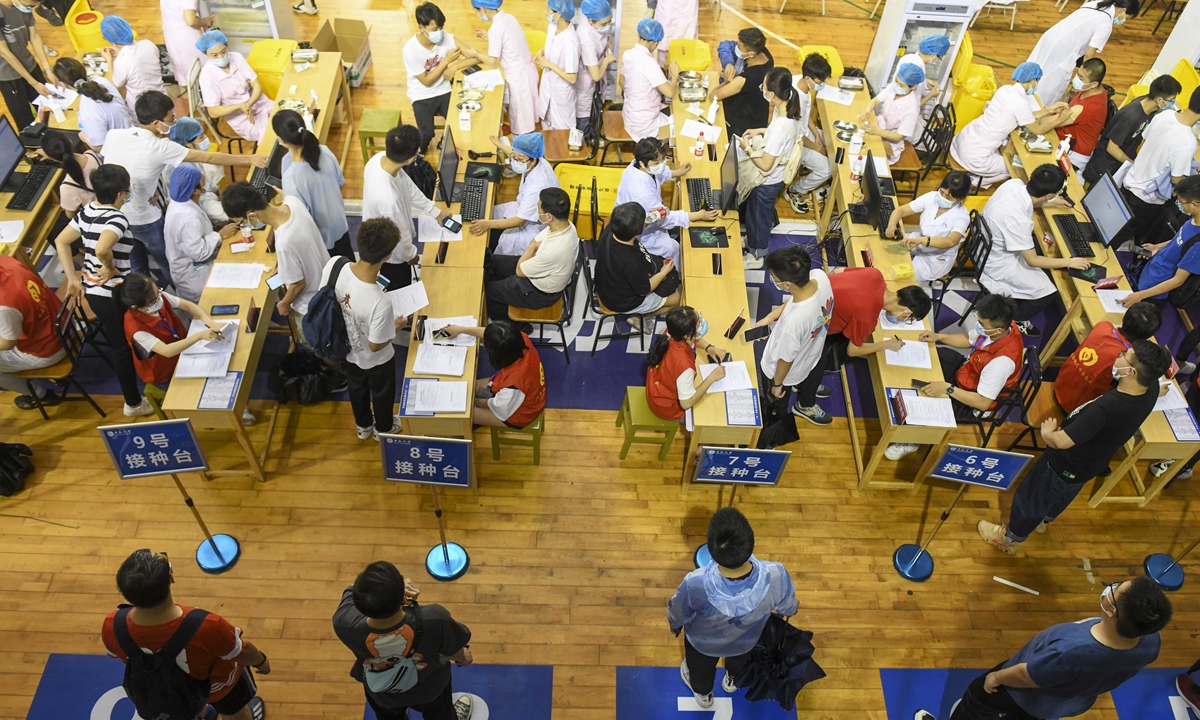
Students at Central South University in Changsha, Central China's Hunan Province line up to get vaccinated on Sunday amid a recent domestic COVID-19 resurgence in two provinces of Anhui and Liaoning. Photo: cnsphoto
Amid recent sporadic outbreaks, China continues to expand and accelerate nationwide inoculation with the launch of the country's first three-dose COVID-19 vaccine, which experts said would provide extra protection than the one-dose and two-dose candidates. The three-shot vaccine is already being administered in at least 13 provincial-level regions in China.
The three-dose COVID-19 vaccine was jointly developed by the Institute of Microbiology of Chinese Academy of Sciences (CAS) and Anhui Zhifei Longcom Biopharmaceutical. It is China's first, as well as the world's first recombinant subunit protein vaccine and it has already been approved by Chinese national authority, according to the website of the CAS microbiology institute.
Since being approved in China on March 10, the vaccine has been administered in at least 13 provincial-level regions in China, including East China's Anhui, Zhejiang, Jiangsu and Shandong provinces, Southwest China's Guizhou, Central China's Hubei and Henan provinces, as well as in Beijing, according to the institute's website and media reports
The company is expected to produce more than 500 million shots of the vaccine by the end of this year, the People's Daily reported on May 22.
Before approving the Zhifei Longcom vaccine, China had approved two-dose inactivated and one-dose recombinant adenovirus vector COVID-19 vaccines.
Compared with the others, the three-dose vaccine can provide more protection as its third dose can serve as a booster shot to enhance immunity, Tao Lina, a Shanghai-based vaccine expert, told Global Times on Sunday.
There have been signs that inoculated people will probably
need a booster in the future. As China has put the epidemic under good control, it is unlikely that the country would provide booster shots to people in the near future. So people living in areas without epidemic can choose the Zhifei Longcom vaccine to get stronger protection although it may take a longer time to finish the procedure, Tao said.
According to the company website, it is better to administer the second and third shots of the Zhifei Longcom vaccine 28 and 56 days after the first injection.
As all five vaccines approved in the Chinese mainland are being rolled out on a more widespread scale, more people are rushing to get vaccinated given the recent cases of infections. China has continued to set records in its daily and overall vaccination numbers.
According to the National Health Commission (NHC) website, nearly 621 million doses had been administered in the country as of Saturday.
Since the Chinese mainland passed the milestone of the first 100 million doses on March 27, the pace of the world's largest vaccination drive has
accelerated constantly. Finishing the second 100 million doses took only 25 days, but the sixth 100 million only took five days, according to figures released by the NHC.
In Beijing, over 86 percent of its residents aged 18 and above had received at least one dose of a vaccine by Sunday, with the vaccination rate in Beijing's 16 districts and counties exceeding 80 percent, the Beijing Daily reported Sunday.
In the process of accelerating vaccination, China is also expanding the age limit for receiving shots.
At the beginning, the first two inactivated vaccines developed by Sinopharm and Sinovac were only accessible to people aged between 18 and 59, while the single-dose vaccine developed by CanSino and the three-dose vaccine are open to people aged 18 and above, including those aged above 60.
The two inactivated vaccines developed by Sinopharm and Sinovac are now approved for those over the age of 60 in some regions, including Beijing and Shanghai.
On May 17, Shanghai started inoculating residents who are 76 years old and above in good health and without contraindications, while in Beijing, about 2.34 million residents aged 60 and above had been vaccinated as of Sunday.




